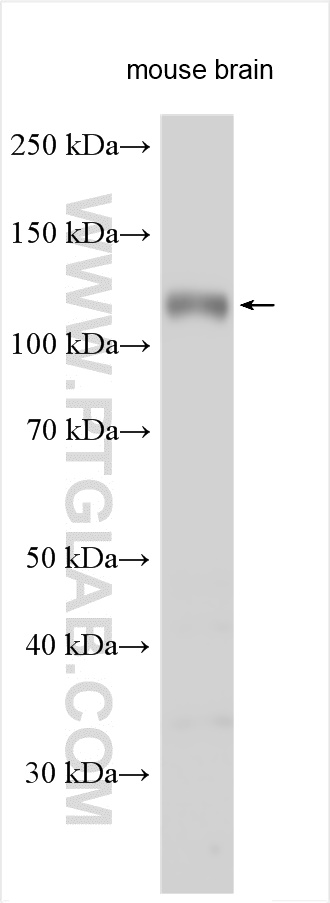验证数据展示
经过测试的应用
| Positive WB detected in | mouse brain tissue |
推荐稀释比
| 应用 | 推荐稀释比 |
|---|---|
| Western Blot (WB) | WB : 1:1000-1:6000 |
| It is recommended that this reagent should be titrated in each testing system to obtain optimal results. | |
| Sample-dependent, Check data in validation data gallery. | |
产品信息
24814-1-AP targets ISLR2 in WB, ELISA applications and shows reactivity with mouse samples.
| 经测试应用 | WB, ELISA Application Description |
| 经测试反应性 | mouse |
| 免疫原 | ISLR2 fusion protein Ag20518 种属同源性预测 |
| 宿主/亚型 | Rabbit / IgG |
| 抗体类别 | Polyclonal |
| 产品类型 | Antibody |
| 全称 | immunoglobulin superfamily containing leucine-rich repeat 2 |
| 别名 | ISLR2, KIAA1465, LINX |
| 计算分子量 | 745 aa, 79 kDa |
| 观测分子量 | 79 kDa, 130 kDa |
| GenBank蛋白编号 | BC152429 |
| 基因名称 | ISLR2 |
| Gene ID (NCBI) | 57611 |
| RRID | AB_3669451 |
| 偶联类型 | Unconjugated |
| 形式 | Liquid |
| 纯化方式 | Antigen affinity purification |
| UNIPROT ID | Q6UXK2 |
| 储存缓冲液 | PBS with 0.02% sodium azide and 50% glycerol , pH 7.3 |
| 储存条件 | Store at -20°C. Stable for one year after shipment. Aliquoting is unnecessary for -20oC storage. |
背景介绍
ISLR2 (immunoglobulin superfamily containing leucine rich repeat 2), also known as LINX. It is expected to be located in cell membrane and the protein is mainly expressed in brain and testis. While the first knockout mouse had impaired development of the internal capsule and no hydrocephalus, a much more recent independent knockout mouse was shown to additionally have severe hydrocephalus. Although the mechanism remains unclear, it may be related to the role of ISLR2 in reorganizing the cytoskeleton of developing neurons (PMID: 30483960). The calculated molecular weight of ISLR2 is 79 kDa, this target has phosphorylation modification and glycosylation modification. And the 130 kDa band is glycosylated (PMID: 29739947).
实验方案
| Product Specific Protocols | |
|---|---|
| WB protocol for ISLR2 antibody 24814-1-AP | Download protocol |
| Standard Protocols | |
|---|---|
| Click here to view our Standard Protocols |
